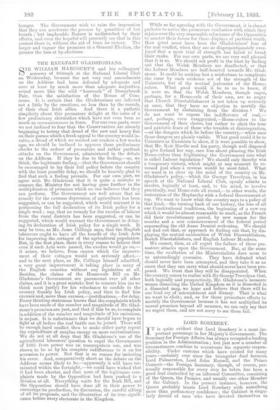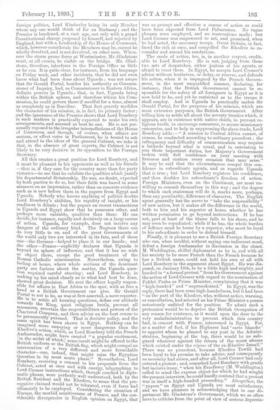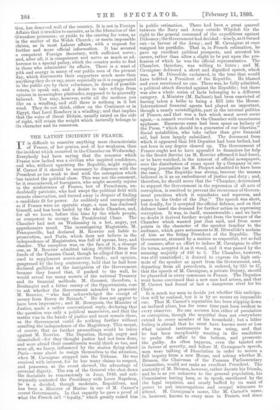LORD ROSEBERY.
IT is quite evident that Lord Rosebery is a most lul- -portant personage in her Majesty's Government. The Secretary for Foreign Affairs has always occupied a leading position in the Administration ; but just now a number of circumstances combine to accentuate his separate respon- sibility. Under customs which have existed for many years—certainly ever since the triangular duel between Lord Palmerston, Lord John Russell, and the Prince Consort—the Foreign Secretary, though, of course, per- sonally responsible for every step he takes, has been a good deal controlled. by an informal Committee, consisting of the Queen, the Premier, and usually one other Member of the Cabinet. In the present instance, however, the Queen probably trusts Lord Rosebery with something more than perfunctory confidence ; the Cabinet is singu- larly devoid of men who have devoted themselves to foreign politics, Lord Kimberley being its only Member whom any one would think of for an Embassy ; and the Premier is burdened, at a vast age, not only with a grand Constitutional change proposed by himself, and rejected by England, but with a Leadership of the House of Commons, which, however considerate the Members may be, cannot be wholly devolved, and is not devolved, on other men. When- ever the storm grows fierce at Westminster, Mr. Gladstone must, at all events, be visible on the bridge. Mr. Glad- stone, therefore, interferes in the Foreign Office as little as he can. It is quite clear, for instance, from his language on Friday week, and other incidents, that he did not even know what had been done about Uganda ; was not aware that Sir Gerald Portal, besides his authority as Commis- sioner of Inquiry, had, as Commissioner in Eastern Africa, definite powers in Uganda ; that, in fact, Uganda being within the British sphere, and therefore within his Com- mission, he could govern there if needful for a time, almost as completely as in Zanzibar. That fact gravely modifies the character of his mission, is, in fact, its primary factor ; and the ignorance of the Premier shows that Lord Rosebery in such matters is practically expected to make his own arrangements, and succeed as best he can. He is not per- sonally exposed to the irregular interpellations of the House of Commons, and though, of course, when affairs are serious, or affect votes in Parliament, he is bound to ask and attend to the ideas of the general Cabinet, we take it that, in the absence of great experts, the Cabinet is not likely to be very decisive in its opposition to the Foreign Secretary. All this creates a great position for Lord Rosebery, and it must be pleasant to his opponents as well as his friends —that is, if they care for the country more than for party victories—to see that he exhibits the qualities which justify his departmental dictatorship. He was, no doubt, expected by both parties to do so, but their faith was based in some measure on an impression, rather than on concrete evidence such as is now before them in the papers from Egypt and Uganda. Nobody who knows anything of politics doubts Lord Rosebery's abilities, his rapidity of insight, or his readiness in debate ; but the papers on recent transactions in Uganda and Egypt show that he possesses other, and perhaps more valuable, qualities than these. He can decide, for instance, rapidly and decisively on a large course of action. Uganda, for example, does not involve any dangers of the ordinary kind. The Negroes there can do very little to us, and of the great Governments of the world only two are interested in its fate, and of these one—the German—helped to place it in our hands ; and the other—France—explicitly declares that -Uganda is beyond its sphere of influence, and that it has no wish or object there, except the good treatment of the Roman Catholic missionaries. Nevertheless, owing to feeling at home, where whole sections of the dominant party are furious about the matter, the Uganda ques- tion required careful steering ; and Lord Rosebery, in making up his mind clearly as to what had best be done, showed great decision. He sent the officer legally respon- sible for affairs in East Africa to the spot, with as free a hand as a British Government can give. Sir Gerald Portal is not to be, as was at first asserted, a mere reporter. He is to settle all burning questions, define our attitude towards the King, quiet religious broils, prevent all massacres, ascertain the responsibilities and powers of the Chartered Company, be permanently and then advise on the best course to pursued. That is decisive policy, and the same spirit has been shown in Egypt. Nothing can be imagined more annoying or more dangerous than the Khedive's action, which, as Lord Rosebery told the French Ambassador, might have created "a popular excitement, [in the midst of which] some insult might be offered to the British uniform or the British flag, which might compel an intervention of a very different and more formidable character—one, indeed, that might raise the Egyptian Question in its most acute phase." Nevertheless, Lord Rosebery, receiving a consent to his proposals from the Cabinet, acted at once and with energy, telegraphing to Lord Cromer instructions which, though couchedin diplo- matic phrase, were perfectly well understood, both by the British Resident and the Khedive, to mean that the pre- rogative claimed would not be tolerated, even if force had ultimately to be employed. Considering the situation of Europe, the morbid sensitiveness of France, and the con- siderable divergencies in English opinion on Egypt, that was as prompt and effective a course of action as could have been expected from Lord Palmerston. No vague phrases were employed, and no reservations made ; but Lord Cromer was empowered to act, and promised, when he had acted, the necessary troops. Great Britain, in fact, faced the risk at once, and compelled the Khedive to re- consider and amend his resolutions.
The mode of action, too, is, in another respect, credit- able to Lora Rosebery. He is not, judging from these two sets of despatches, either jealous of his agents, or afraid to trust them. In Egypt, he accepts Lord Cromer's advice without hesitation, or delay, or reserve, and defends his action, when it is impugned by the French Govern- ment, in the most unqualified manner, declaring, for instance, that the British Government cannot be re- sponsible for the safety of all foreigners in Egypt as it is now held to be, and yet be restricted as to the troops it shall employ. And in Uganda he practically makes Sir Gerald Portal, for the purposes of his mission, which are most extensive purposes, the British Government. After telling him to settle all about the seventy treaties which, it appears, are in existence with native chiefs, to prevent re- ligious broils, to encourage commerce, to secure missionary enterprise, and to help in suppressing the slave-trade, Lord Rosebery adds :—" A mission to Central Africa cannot, of course, be conducted according to ordinary precedent ; the infrequency and difficulty of communication may require a latitude beyond what is usual, and in entrusting to you these important duties, her Majesty's Government reckon with full confidence on your meeting with firmness and caution every occasion that may arise." It may be said that the circumstances compel this con- fidence in subordinate agents, and as regards Uganda that is true ; but Lord Rosebery registers his confidence, and thus doubles his subordinate's freedom of action. Foreign Ministers, even on the Continent, are most un- willing to commit themselves in this way ; and the degree to which each statesman will do it, marks more, perhaps, than any peculiarity, difference of character, The English agent generally has the nerve to "take the responsibility" of new action, but it makes all the difference in the world, both to him and his superior at home, whether he has written permission to go beyond instructions. If he has not, part at least of the blame falls to his share, and he may even be repudiated; while if he has, the whole burden of defence must be borne by a superior, who must be loyal to his subordinate in order to defend himself.
Finally, it is pleasant to see a British Foreign Secretary who can, when needful, without saying one indiscreet word, defeat a foreign Ambassador in discussion in the closet. M. Waddington, skilful diplomatist as he is, and with all his anxiety to be more French than the French because he has a British name, could not hold his own at all with Lord Rosebery in the argument about Egypt. He was dis- posed, on January 18th, to be a little high and mighty, and handed in "a formal protest "from his Government against the action of Lord Cromer with regard to the nomination of Fakhri Pasha as Prime Minister, complaining that it was " high-handed" and "unprecedented." In Egypt, was the reply, there had been some high-handedness, but it had been "on the part of the Khedive, who, without notice, warning, or consultation, had selected as his Prime Minister a person notoriously unfitted for the position. To admit such a pretension would be to deprive the British Occupation of any reason for existence, as it would open the door to the very maladministration to prevent which this country had, in concert with France, intervened in Egypt. For, as a matter of fact, if his Highness had 'carte blanche' to appoint whom he pleased to any post in the Admini- stration, beginning at the top, there would be no safe- guard whatever against the return of the worst abuses which existed under the regime of the ex-Khedive ' There was no precedent, because Khedive Tewfik had been loyal to his promise to take advice, and consequently no necessity had arisen, and after all, Lord Cromer. had only entered a protest ; and, remarked Lord Rosebery with gentle but incisive irony, "when his Excellency .(M. Waddington) called to mind the express object for which he had sought the present interview, he could hardly contend that a protest was in itself a high-handed proceeding." Altogether, the " papers " on Egypt and Uganda are most satisfactory,' and we have pleasure in acknowledging that in one de- partment Mr. Gladstone's Government, which we so often have to criticise from the point of view of serious deprecia. lion, has deserved well of the country. It is not in Foreign Affairs that it truckles to enemies, as in the liberation of the Q-weedore prisoners ; or yields to the craving for votes, as in the matter of the Welsh Church ; or meets impossible claims, as in most Labour affairs, with a request for further and more official information. It has secured a competent Foreign Secretary, with sufficient nerve ; and, after all, it is competence and nerve as much as ad- herence to a special policy, which the country seeks to find in those who administer its affairs. There is a want of pith and energy in many of our public men of the present day, which disconcerts their supporters much more than anything they do or say, more especially as it is exaggerated in the public eye by their reluctance, in dread of possible voters, to speak out, and a desire to take refuge from opinion in meaningless platitudes, supposed to be generally believed. You may, however, write all the mottoes you like on a windbag, and still there is nothing in it but wind. They do not think, either on the Continent or in Egypt, that Lord Rosebery is a windbag ; and that implies that the voice of Great Britain, usually raised on the aide of right, will retain the weight which naturally belongs to its character and its resources.




































 Previous page
Previous page